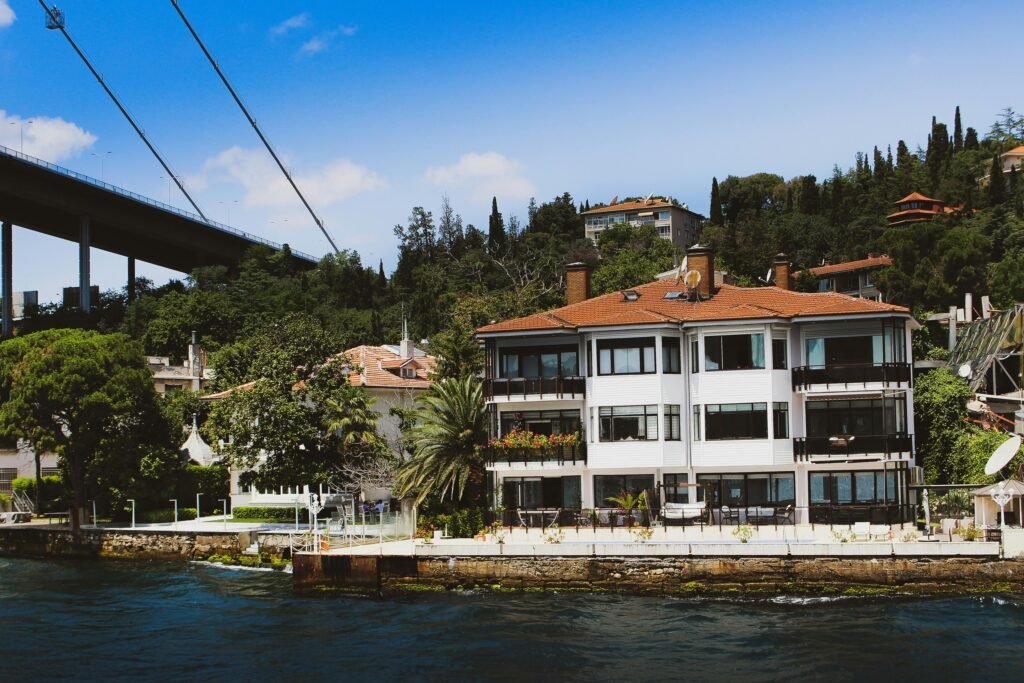Imagine waking up to the smell of Turkish coffee, with the Bosporus or the Mediterranean Sea outside your window. Is making this dream a permanent reality possible?
Shortest answer to this question is absolutely. Anyone can live permanently in turkey with investment programs, neutralization or marriage.
This guide is for anyone—digital nomads, retirees, investors, or families—seriously considering making Turkey their long-term home.
In this article we are going to inform about living in turkey permanently through pathways to residency, costs, challenges, and first steps.
Let’s dive into it.
Understanding Turkish Residency and Citizenship

Turkish residency allows foreigners to stay legally for more than 90 days and is obtained through various types of residence permits depending on the purpose of stay (work, study, family, etc.). After living in Turkey continuously for eight years with a valid short-term permit, an individual may become eligible for a long-term residence permit. Permanent residency then is valid for life and can provide stability without citizenship.
Turkish citizenship can be acquired through several means:
- A person is born a Turkish citizen if their mother or father is a Turkish citizen.
- Later acquisition through naturalization if living continuously in Turkey for 5 years without interruption and fulfilling conditions like good Turkish command, good morals, and health.
- One pathway to citizenship requires being married to a Turkish national for at least three years, with the marriage still intact at the time of application.
- Citizenship by Investment, for example by investing a minimum fixed capital of $500,000 or purchasing property worth $400,000 with restrictions on resale, or creating jobs, with due governmental verification.
- The naturalization process involves application, verification of requirements, interviews, and official decisions. Dual citizenship is recognized under Turkish law.
Summary of Residency
- Residence permit needed for stays longer than 90 days.
- Application within the first month of arrival.
- Documents required include passport, photos, proof of financial means, health insurance.
- Long-term residency after 8 years continuous stay.
Summary of Citizenship
- By descent: child of Turkish parent(s).
- By naturalization: 5 years residence, language, moral, and health conditions.
- By marriage: 3 years of marriage.
- By investment: minimum $400,000 to $500,000 investment options.
- Process takes months to years depending on route.
- Dual citizenship permitted.
These details offer a clear understanding of both residency and citizenship acquisition pathways in Turkey.
Your Pathways to Permanent Life in Turkey
Exploring the various pathways to permanent life in Turkey is the first step. Whether through investment, marriage, long-term residency, or citizenship by exceptional means. Lets Discover how we can transition from a visitor to a permanent resident. Unlocking a lifetime of opportunity in the crossroads of Europe and Asia.
1. The Short-Term Residence Permit (The Most Common Route)

The Short-Term Residence Permit (the most common route) typically refers to a temporary residence permit granted to foreigners who intend to stay in a country for a limited period for specific purposes such as work, study, scientific research, business, or family reunification. This permit usually allows the holder to reside in the country for up to one year, with the potential for renewal depending on the country’s regulations.
Common Features of Short-Term Residence Permits:
- Purpose-specific: Issued for defined reasons like employment, education, research, or family.
- Duration: Generally valid for up to one year initially.
- Renewability: Often renewable if the applicant continues to meet requirements.
- Restrictions: Activities permitted are usually tied to the permit’s stated purpose; for example, a work permit allows employment but might restrict studying.
- Pathway: Can serve as a stepping stone towards long-term or permanent residence permits.
Examples and General Requirements:
- Countries may require applicants to demonstrate their purpose for stay, sufficient financial means, health insurance, and meet legal entry requirements.
- For instance, Germany’s Temporary Residence Permit is valid for one year and must be applied for within 90 days of arrival. The permit specifies allowed activities, such as employment or study, and is often the first permit leading to permanent residence.
- France issues temporary worker permits allowing employment and requires applicants to validate the permit online upon arrival.
- In many places, short-term residence permits provide a legal basis for foreigners to live temporarily and engage in authorized activities before applying for longer-term status.
Why It Is the Most Common Route?
- It fits diverse needs like work assignments, education programs, and family visits.
- It is accessible to many applicants due to relatively short initial commitment.
- It is a necessary initial status that often precedes permanent residence.
2. The Long-Term Residence Permit (Permanent Residency)

Eligibility for the Long-Term Residence Permit, Turkey’s equivalent of permanent residency, requires an applicant to have lived in the country legally and without interruption for at least eight years. Unlike temporary permits, it is issued indefinitely and offers a range of rights similar to those of Turkish citizens, except certain exceptions specified by law.
Requirements for Long-Term Residence Permit in Turkey:
- One of the primary stipulations is an uninterrupted period of lawful residence in Turkey lasting at least eight years.
- The applicant must not have received any form of social aid or financial assistance from Turkish state institutions within the preceding three-year period.
- Proof of stable income and self-sufficiency.
- Valid health insurance coverage.
- No threat to public security or public order.
- Not holding refugee or temporary protection status.
Application Process:
- Applications can be made online through the E-İkamet system.
- An appointment is required at the Provincial Directorate of Migration Management in the applicant’s place of residence.
- The final decision is made by the Ministry of Interior, and the permit card is issued by local governorates.
- This permit is granted free of charge and confers an indefinite right of residence within Turkey.
Rights and Benefits:
- Indefinite legal residence without the need for renewal.
- Right to work without a separate work permit after holding a legal work permit or residence permit for 8 years (indefinite work permit eligibility).
- Access to healthcare, education, property ownership, travel freedom, and investment opportunities.
- Ability to apply for Turkish citizenship after 5 years of uninterrupted residence from the date of application.
Revocation and Requirements:
- The permit may be revoked if the holder poses a serious threat to public security or stays outside Turkey for more than one year without valid reasons such as health, education, or compulsory public service.
- To qualify for citizenship via this route, the resident must stay in Turkey at least 5 years without interruption, and absences outside the country during this time cannot exceed 12 months.
This permit is essentially Turkey’s form of permanent residency, offering strong legal security and integration opportunities for long-term foreign residents.
3. Turkish Citizenship by Investment (The Fastest Track)

The fastest track to Turkish citizenship by investment is typically through the real estate investment route, where an individual can acquire Turkish citizenship within about 3 months by investing a minimum of $400,000 in Turkish property. This fast-track option may involve an extra fee.
Key Investment Options and Fast Track
The permanent pathway to citizenship in Turkey can be achieved by the key points below.
- Acquiring property valued at a minimum of $400,000 and retaining it for at least three years is widely regarded as the most common and cost-effective pathway.
- Other options include a minimum $500,000 investment in fixed capital, Turkish bank deposits, government bonds, or venture capital/real estate funds, with the same 3-year holding requirement.
- Job creation of at least 50 Turkish nationals is also an eligible path.
The citizenship application process generally takes between 3 to 6 months, but with a fast-track process, it can be shortened to about 2 to 3 months for an additional fee.
Requirements and Benefits
Turkey citizenship programs have the minimum requirements. And the benefits of it is spoken below.
- No physical residency requirement to maintain citizenship.
- A mandatory condition is that the investment must remain under the investor’s ownership for no less than three years.
- The program welcomes families: spouse and children under 18 can also gain citizenship.
- Holders of a Turkish passport enjoy visa-free or visa-upon-arrival entry to more than 110 destinations worldwide.
- Applicants must pass background and security checks, including compliance with Interpol and FATF standards.
This Turkish Citizenship by Investment program is one of the fastest second passport routes globally, offering a relatively quick timeline and multiple investment options depending on the investor’s preference and budget.
Turkish Citizenship by Other Means
Living permanently in Turkey can be acquired by several other means apart from investment:
Citizenship by Birth
A child born to at least one Turkish parent (mother or father) automatically acquires Turkish citizenship, regardless of birthplace (in or outside Turkey).
Citizenship by Descent
Citizenship by descent applies when a person can prove lineage from a Turkish parent or sometimes grandparent.
Proof of Turkish citizenship of the parent is required with official documents like birth certificates, passports, or population registry records.
This method grants citizenship based on bloodline (jus sanguinis), meaning your parents’ nationality, not where you were born, is what counts.
Citizenship by Marriage
A foreign spouse married to a Turkish citizen for at least 3 years may apply for citizenship.
Requirements include proof of continuing marriage, intention to reside in Turkey, clean criminal record, and not posing a security threat.
The spouse must also speak adequate Turkish during the final interview.
The procedure typically requires a minimum of one year to complete. Though it can often extend beyond this timeframe.
Citizenship by Naturalization
Foreigners who have legally resided in Turkey for at least 5 years continuously with a valid residence permit can apply for naturalization.
Additional criteria include good moral character, basic Turkish language proficiency, economic stability, and passing security checks.
The application involves submission to the General Directorate of Citizenship Affairs and may take several steps to finalize.
Related Content: What is the easiest way to get Turkish Citizenship?
These non-investment methods offer pathways based on family ties, marriage, residency, and heritage, each with distinct eligibility and procedural requirements. Turkish citizenship by descent and by birth are automatic in certain cases, while marriage and naturalization require a formal application process and meeting specific conditions.
The Reality Check: Pros and Cons of Living Permanently in Turkey
Here is a comparative table of the pros and cons of living permanently in Turkey, summarizing key advantages and disadvantages side by side for better clarity:
| Aspect | Pros | Cons |
|---|---|---|
| Cost of Living | Affordable living costs compared to Western countries; lower housing, utilities, and food prices. For example, renting a two-bedroom apartment in cities like Antalya can be $500-600 per month. | Rising inflation and currency volatility can cause living costs to fluctuate |
| Climate | Mild Mediterranean climate, warm summers, mild winters favorable for outdoor lifestyle | Seasonal variations and hotter summers in some regions |
| Community & Culture | Friendly, welcoming locals; rich cultural heritage; growing international expat communities | Language barrier outside major cities; cultural differences and occasional social adjustment |
| Healthcare | Access to good quality, affordable public and private healthcare | Public healthcare can be variable in rural areas |
| Bureaucracy & Administration | Legal residence status can be maintained, simplified processes for residency and citizenship | Red tape, slow processes, limited English spoken in government offices |
| Job Market & Work | Opportunities for entrepreneurs, online workers, retirees; work permits possible with residence | Difficult job market for expats; lower wages and work permit restrictions |
| Safety & Stability | Generally safe cities with low violent crime rates; good infrastructure | Political and economic instability concerns; traffic safety issues |
| Mobility & Travel | Strategic location bridging Europe and Asia; easy access to neighboring countries | Visa restrictions and travel bureaucracy in some cases |
| Family & Education | Family included under residency permits; access to quality education in public and private schools | Education mostly in Turkish; limited international schools outside big cities |
| Property & Investment | Favorable property laws for foreigners; potential for citizenship via investment | High property prices in major cities; property taxes and ownership formalities |
| Social Services | Access to social benefits and government health insurance with valid residence | Some services may be limited for non-citizens |
Living in Turkey offers a generally affordable and culturally rich lifestyle with good healthcare and family options, but potential challenges include language barriers, bureaucracy, economic fluctuations, and certain adaptation issues for foreigners.
First Steps to Making Your Move to Turkey

If you have finally decided to move to turkey than here are the first essential steps to make your move to Turkey smoother and well-prepared:
1. Define Your Purpose of Moving
Identify if you are moving for work, study, retirement, investment, or family reunification. This determines your visa and residence permit requirements.
2. Check Visa Requirements
Apply for the appropriate visa from your home country before arrival if needed (work visa, student visa, tourist visa, etc.).
3. Secure Accommodation
Decide to rent or buy property depending on your plans. Renting initially before buying is common for newcomers to explore the area.
4. Prepare Important Documents
- Valid passport with minimum 6 months validity beyond entry.
- Completed visa or residence permit applications.
- Proof of financial means.
- Health insurance coverage.
- Criminal record certificates and residence proof like rental contracts or ownership documents.
5. Apply for a Residence Permit
Once in Turkey, you need to apply for a residence permit within the first month of arrival for stays longer than 90 days. This is key for legal long-term stay.
6. Open a Turkish Bank Account and Get a Tax Number
You’ll need it to handle your finances, pay bills, and buy a home.
7. Get Health Insurance
Mandatory for residence permit applications and access to healthcare.
8. Consider Transportation of Belongings and Pets
Decide what to ship or buy locally, understanding customs duties and logistics.
9. Learn Basic Turkish
This greatly assists with integration and navigating bureaucracy.
10. Connect with Expat Community
A great way to settle in is to meet people through expat groups and local associations. They can make it easier to feel at home and offer useful advice.
These steps establish a strong foundation for a legal, comfortable, and smooth transition to life in Turkey.
Frequently Asked Questions (FAQs)
Q: Can I work in Turkey with a residence permit?
Ans: A standard short-term tourist residence permit does not allow you to work. You need a separate work permit.
Q: How much income do I need to show for a residence permit?
Ans: Typically, at least the Turkish minimum wage. The exact amount is a key point to update yearly.
Q: Is it safe to live in Turkey?
Ans: Discuss general safety while advising readers to check their home country’s travel advisories for updated information.
Q: Can I buy property as a foreigner?
Ans: Yes, and it can be a pathway to citizenship (via the investment program). Note military zone restrictions.


One response to “Can I Live Permanently in Turkey? Your Ultimate 2025 Guide”
[…] Turkey: Residency available through property investment, with minimum property purchase amounts around $400,000. Pathway to citizenship is also possible under certain conditions. […]